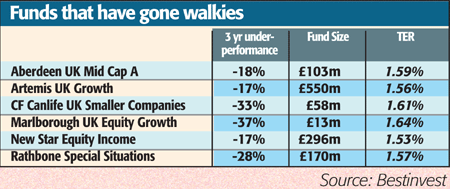
Most professional fund managers can’t have been terribly pleased when Jayesh Manek arrived on the scene in 1997. The West London chemist had effectively won a job in the City in a competition, receiving backing for his own fund from enthusiastic investors after winning a Sunday Times fantasy portfolio contest for two years in a row in the mid-1990s.
So there must have been more than a hint of malicious pleasure from some when his fund, Manek Growth, promptly lost a lot of money after following precisely the strategy that had won him the portfolio competitions – betting heavily on booming technology stocks.
But it seems Manek is now back on his competition-winning form. The Manek Growth fund has returned an impressive 12.1% over the past 12 months, easily trouncing the loss of 8% posted by the average fund in the UK All Companies sector. Manek says the past year’s performance is part of a new, consistent trend. He tells The Mail on Sunday that “I overhauled my investment process, analysing my trading records to see what was working”.
Financial adviser Bestinvest’s latest list of ‘dog’ funds shows that many fund managers would be well advised to do the same. Manek is no stranger to the dogs’ list, having been on it for five years in a row up until 2005. And to qualify as a ‘dog’, a fund really does have to be bad. It must have underperformed its benchmark in each of the past three years, and have done so by at least 10%. Sadly, this year’s list was not short of names – Bestinvest labelled 70 unit trusts as ‘dogs’, double the number in January 2006.
The fund management group with the biggest kennel is Schroders, with £1.2bn of assets in dog funds. Scottish Widows is close behind with £778m, and Fidelity next on £733m, as the latter’s UK growth fund continued to perform poorly following three changes of manager in just two years. History suggests that investors should favour managers with “existing track records of adding value in this sector”, says Stephen Marriott of Bestinvest in The Sunday Telegraph – something that perhaps investors should have noted in 1997, when they queued up to give money to a chemist with only paper experience of stock trading.
Despite the upturn in Manek’s fortunes since then, if you are going to buy into a UK companies fund, then we’d be more inclined to take a look at Standard Life UK Smaller Companies. According to Bestinvest, the fund has outperformed its benchmark by 38% over three years, and comes top of their ‘best in show’ awards, for funds that have beaten their benchmarks by at least 10% over the past three years.